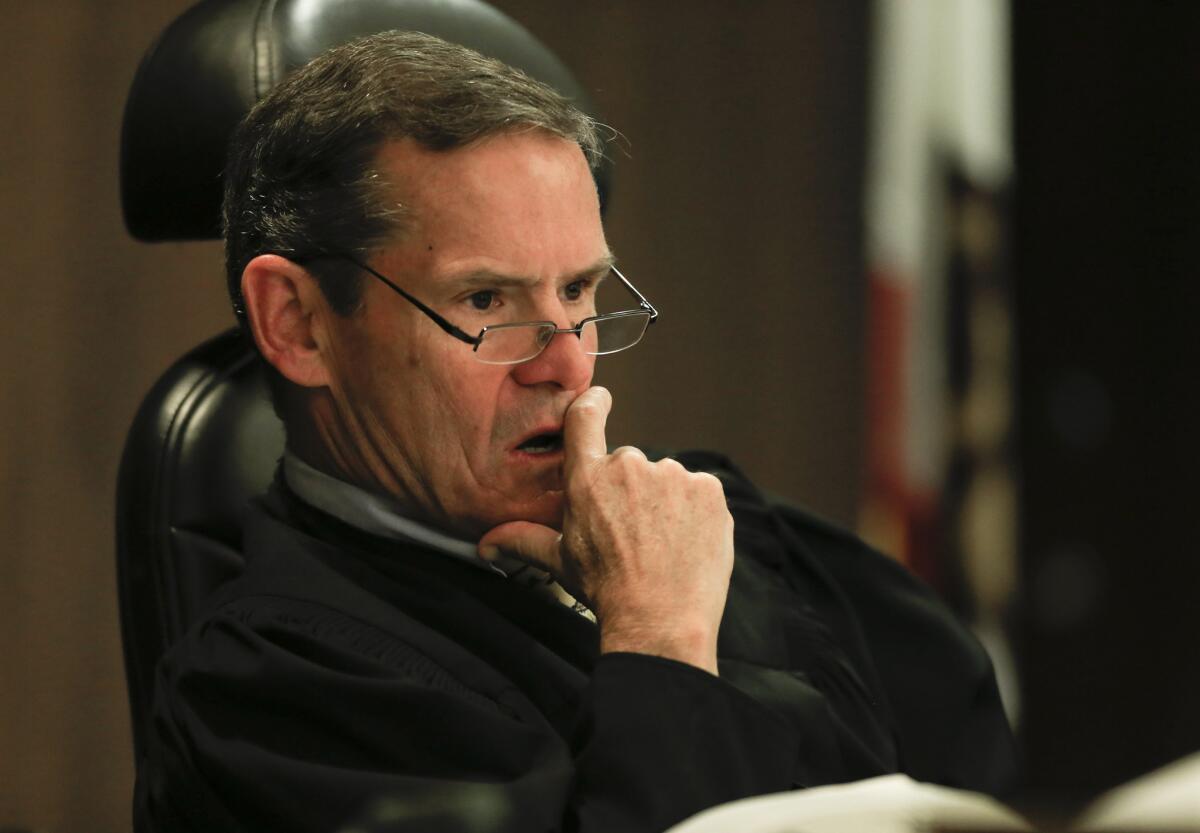Seal Beach killer will face death penalty despite prosecutor ‘misconduct’

An Orange County judge has ruled that prosecutors had engaged in misconduct in the case of a man who killed eight people at a Seal Beach salon but declined to dismiss the death penalty against him or to bar the district attorney’s office from trying the case.
Superior Court Judge Thomas Goethals did grant a motion by the defense to prevent prosecutors from presenting in court recorded statements allegedly made by defendant Scott Dekraai to a jailhouse informant.
Prosecutors had earlier said they would no longer seek to use the evidence.
The “failures in this case, although disappointing, even disheartening, to any interested member of this community, were negligent rather than malicious,” Goethals wrote in a 12-page ruling.
The ruling stems from a months-long hearing in which Dekraai’s defense attorneys argued that prosecutors had engaged in widespread misconduct, including unconstitutionally deploying jailhouse informants and concealing their work from defense attorneys.
But after hearing months of testimony from prosecutors, law enforcement and others and reviewing thousands of pages of documents, Goethals said the conduct did not rise to the level of “outrageous government conduct” that would have required more serious sanctions.
Dekraai pleaded guilty in May to eight counts of murder and one count of attempted murder in the 2011 mass shooting and is now awaiting a hearing to determine whether he should face death for the crimes.
During the misconduct hearing, which began in March, members of the district attorney’s office acknowledged that they had failed to turn over evidence in recent cases.
In June, the district attorney’s office agreed to vacate the murder conviction of a Santa Ana man following revelations that emerged from the hearing that key evidence was not turned over. And prosecutors have said additional defendants will be notified about evidence that was not turned over.
But they said the failures were the result of lack of legal understanding, heavy caseloads and intervention by federal agents among other reasons.
In his ruling, Goethals said he was unconvinced by those arguments.
“Time and again this court heard prosecutors explain, in so many words, that their failures in this and other cases were the result of a misunderstanding of the law; or heavy caseloads; or complex investigations; or orders they received from federal authorities,” he wrote. “None of these explanations constitutes a legitimate excuse for the failures demonstrated.”
Though he stopped short of adopting the most serious remedies, Goethals found prosecution and law enforcement failures in several areas.
He found that informants and inmates were “at times intentionally moved inside the Orange County jail by staff…in the hope that inmates would make incriminating statements to those informants.”
The movements were not documented by law enforcement, he wrote. Additionally, he wrote, false documentation was probably provided to jailhouse informants so that they could increase their credibility with targeted inmates.
The activities should “have been disclosed to defense counsel,” Goethals wrote.
The judge also said he found the “cavalier attitude” of one gang prosecutor toward the discovery of evidence “patently inappropriate and legally inadequate.”
And he faulted Dekraai’s prosecutor, Assistant Dist. Atty. Dan Wagner, for not looking into the criminal history and relationship with law enforcement of the informant he hoped would testify against Dekraai.
Soon after Dekraai arrived in jail, informant Fernando Perez told deputies and prosecutors the defendant, who was housed in the cell next to him, had talked about his crimes. Officials responded by putting a recording device in Dekraai’s cell that captured their conversations.
When prosecutors sought to use the information, they did not tell Dekraai’s defense attorney’s about Perez’s long history as a jailhouse informant. And Wagner later filed a sworn statement saying Perez would not be given any leniency for his efforts on the case.
The statement, Goethals wrote, was “at least seriously misleading.” But he said he believed Wagner when he testified that he was never intentionally false.
Susan Kang Schroeder, chief of staff for Dist. Atty. Tony Rackauckas, said the D.A.’s office is looking to reduce caseloads and has implemented additional training for prosecutors in response to the hearing.
“The D.A. agrees that errors were made, that there were mistakes that were made, but none of them were intentional or malicious,” she said.
Lt. Jeff Hallock, a spokesman for the Orange County Sheriff’s Department, said in a written statement that the department has also made changes based on the issues raised by Goethals, including requiring “more detailed documentation of our involvement with informants.”
“Moving forward, we will also require more from agencies who wish to utilize informants in our jails and we will work with the district attorney’s office to ensure all appropriate information is disclosed as required by law,” he wrote.
Assistant Public Defender Scott Sanders, who filed the motion, said he was pleased at the judge’s misconduct findings but believes he should have gone further.
“From my perspective there’s overwhelming evidence that what they engaged in was not negligence but was purposeful,” he said.
His office is now considering whether to ask an appellate court to consider the motions, he said.
For more Orange County news follow @palomaesquivel.
More to Read
Start your day right
Sign up for Essential California for news, features and recommendations from the L.A. Times and beyond in your inbox six days a week.
You may occasionally receive promotional content from the Los Angeles Times.







